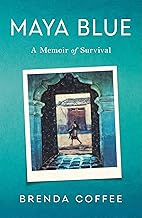Maya Blue by Brenda Coffee
A high-voltage, true-life account of love, risk and survival — and what it takes to recover from traumatic experiences
Some memoirs invite you to sit quietly and listen. Maya Blue does the opposite.
Brenda Coffee’s story swings the door wide open and pulls you into a life that starts like a dream and veers, chapter by chapter, into places you don’t expect to go. It reads with the tension of a thriller, yet it’s rendered with the candor and empathy of a confidante.
Coffee traces how an eager young wife is dazzled by charisma, money and innovation — and how these slowly give way to secrecy, addiction and real danger. By the end, what remains is a woman who has learned, through bitter experience, never to surrender her voice.
From a Texas Fairytale to a House Full of Secrets
When Coffee marries the charming, much-older Philip, she accepts a role she’s been rehearsing since girlhood: be loyal, be useful, be indispensable. Their home — San Antonio’s storied “Spy House on the Hill” — becomes a symbol of that promise.
It’s glamorous, a little notorious, and the perfect stage for a couple whose days revolve around big ideas and bigger risks. Philip is a born inventor and showman; Coffee, still in her early twenties, throws herself onto the ride with both feet. For a while, it all feels exhilarating.
Then the mood shifts. Philip’s sleepless nights lead to prescription pills, and a dependent habit hardens into something darker. A basement workspace morphs into a clandestine drug lab, and the cool thrill of invention curdles into secrecy and paranoia.
Coffee renders these turns with an almost cinematic clarity — the quick silences, the unspoken calculations, the way you start measuring your words around someone you love because the wrong syllable could spark a blaze. There’s wealth in the rooms, but there’s also fear; a bodyguard appears; the phone might be bugged; the front door becomes something you listen to rather than simply open.
As the marriage frays, Coffee widens the frame. Business pressures mount; a smokeless cigarette prototype puts the couple uncomfortably close to the ire of Big Tobacco; and the atmosphere — at home and beyond — grows charged. Eventually, grief, exhaustion and the urge to start over push her far from Texas and into unfamiliar terrain.
What should have been a healing trip lands her in harm’s way: a roadside abduction in Central America, a stretch of jungle where help is a rumor, not a plan. Coffee recounts the ordeal in clean, propulsive prose — never sensational, always specific. You feel the heat, the calculation, the small, crucial choices that keep a person moving forward when standing still could be fatal.
None of it is easy to read; all of it feels real. One of Coffee’s quiet gifts is knowing when to pause and let a scene breathe. She doesn’t rush to the lesson. She lets the moment — its fear, its odd grace — speak first. That restraint makes the book’s most harrowing passages bearable and its later reflections ring louder.
Voice, Agency and the Work of Healing
Trauma can flatten a person or force them to reassemble themselves with stronger joints. Coffee chooses the latter. The final movement of Maya Blue focuses on the painstaking work of reclaiming identity: therapy, boundaries, new professional chapters and a renewed insistence on being heard.
Coffee also looks backward with clarity. She recognizes how early caretaking and a lifetime of people-pleasing primed her to accept dangerous compromises. The book never scolds her younger self. Instead, it offers hard-earned compassion — and a blueprint for stepping out of the patterns that keep smart women quiet.
That’s the memoir’s beating heart: the insistence that power doesn’t arrive in one cinematic moment. It’s rebuilt in small decisions — naming what happened, telling the story without trimming the edges, choosing not to hide so someone else can stay comfortable. By the time Coffee writes, “never surrender your voice,” it lands less as a slogan and more as a lived directive.
Coffee’s journalism background shows in the clean line of her sentences and the steady hand with which she toggles between action and reflection. The book is organized in three distinct acts: the seductive early marriage and descent; the international crisis that turns survival into a daily practice; and the measured climb back to herself. The pacing is brisk without feeling breathless, and the scenes are stitched together with sensory detail that keeps the story grounded even as the stakes rise.
Importantly, she resists an easy villain/victim binary. Philip’s brilliance and his undoing are both present. Coffee acknowledges the ways love, fear and loyalty tangled her judgment. That nuance makes the memoir feel generous, even when it’s unsparing. The result is a narrative that’s both intimate and expansive: one woman’s story of addiction, grief, danger and recovery that doubles as an inquiry into how we give away our agency — and how to get it back.
A Memoir That Reads Like a Thriller
Maya Blue will grip readers who gravitate toward narrative nonfiction that moves like suspense: domestic-noir fans, memoir readers interested in resilience and mental health, and anyone drawn to stories of women reclaiming power after long seasons of silence.
Coffee is frank about addiction, psychological abuse, violence and assault; those elements are handled with care and context, but they are present. The book never exploits those traumas for shock. It documents them, then insists on life beyond them.
As a reading experience, this is the kind of memoir that keeps you up later than you planned. You tell yourself you’ll stop at the next chapter break. Then something clicks — the way a conversation turns, an old fear loosens, a door finally opens — and you keep going. When the last page lands, you’re likely to feel what many nonfiction readers crave: not just the thrill of a wild true story, but the steadier satisfaction of watching someone earn her way back to herself.
Brenda Coffee’s Maya Blue is a high-voltage account of love, risk and survival that ultimately argues for something radical in its simplicity: the life you want begins with the voice you own. Few memoirs balance danger and tenderness this well. Fewer still leave you rooting so hard for the author to make it out — and cheering when she does.
 Brenda Coffee is a businesswoman, public speaker, and former board member and managing consultant to a public company she sold to Big Pharma. She is also the creator of two Top 10 websites, including 1010ParkPlace.com, home to her popular BRENDA’S BLOG, which has repeatedly been voted a Top 10 Blog/Site for Women Over 50 by FeedSpot. Brenda is also the author of The Breast Cancer Sisterhood and Husbands and Heroes: The Breast Cancer Caregiver, and was formerly a writer for Spirit, Southwest Airlines’ magazine. A graduate of Trinity University with a degree in journalism, she lives in San Antonio, Texas.
Brenda Coffee is a businesswoman, public speaker, and former board member and managing consultant to a public company she sold to Big Pharma. She is also the creator of two Top 10 websites, including 1010ParkPlace.com, home to her popular BRENDA’S BLOG, which has repeatedly been voted a Top 10 Blog/Site for Women Over 50 by FeedSpot. Brenda is also the author of The Breast Cancer Sisterhood and Husbands and Heroes: The Breast Cancer Caregiver, and was formerly a writer for Spirit, Southwest Airlines’ magazine. A graduate of Trinity University with a degree in journalism, she lives in San Antonio, Texas.

Publish Date: 5/20/2025
Genre: Memoir, Nonfiction
Author: Brenda Coffee
Page Count: 280 pages
Publisher: She Writes Press
ISBN: 9781647429065


